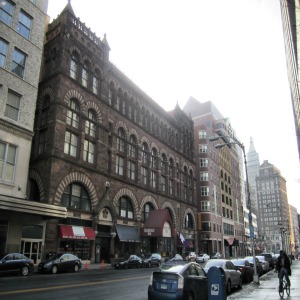
If Hartford often seems left out of discussions about city life and urban economies, that's because it is. The book Confronting Urban Legacy: Rediscovering Hartford and New England's Forgotten Cities aims to fill this gap in the literature.
Editors Xiangming Chen (Dean and Director of the Center for Urban and Global Studies at Trinity College) and Nick Bacon (Research Associate at Trinity and Ph.D. candidate in urban anthropology at the Graduate Center of the City University of New York) joined Tom Condon, a contributor to the book and deputy editorial page editor and columnist at the Hartford Courant, to talk about the past and future of this "second city" at the Mark Twain House Tuesday night.
Chen emphasized the importance of understanding cities in a global economy. Cities' public spaces, he said, are where significant conflicts play out. And the study of global cities is reduced to those of great size, such as New York and Shanghai. But despite their physical differences, he found similar dynamics among the mega-cities and Hartford.
Hartford was an early global city, Chen said, and has been dealing since its settlement almost four centuries years ago with issues of immigration, exports, and the rise and fall of industries. Even today, the city (especially when understood to include some configuration of the surrounding land which comprised the original Hartford) ranks very high on lists of US and world productivity, and maintains some of its global reach.
Hartford, Bacon noted, is overlooked in several ways. As a smaller city it is unduly outcast from analysis, and when studied it is often misunderstood in that its issues are more complex than the simple story of city versus suburbs.
Condon delved into the specifics of how Hartford (the other cities covered in the book are Springfield and Lawrence in Massachusetts and Portland, Maine) came to face some of its current challenges. The city's weakness, he said, is its size: 18 square miles (which Chen compared to the Denver International Airport's 53.) In the 1980s, Condon recalled, the city felt as if it was "running on the fumes" of 100 years of prosperity. But it had been "eviscerated" by highways, cut off from the river and from itself. And decline had set in with the loss of manufacturing and agricultural jobs. Though insurance companies stayed in the city, people who worked for them did not. Condon described the changes to Hartford's political system, leading up the relatively recent introduction of a Strong Mayor system, which he said "hasn't started to work yet, but it will." In the early 1990s, he said, the city began to turn around.
One example he gave of a lack of regional cooperation was the installation of the new Farmington Avenue water main. Work along the road is being done by each municipality, Condon said. When it's completed, Hartford's segment of Farmington Avenue will have a bike lane, while West Hartford's will not, "which is stupid."
Bacon agreed that the "only real solution is going to be regionalism," but the panel was not entirely optimistic about its prospects. One vehicle they cited for a potential shift in the regional direction was the Capitol Region Council of Governments, which is in the process of expanding to 38 towns, and which could in theory merge with the Metropolitan District Commission.
At several points, a quote attributed to former Indianapolis Mayor William Hudnut floated around the discussion: "You can't be a suburb of no place." All the towns in the region, the panelists agreed, have an interest in Hartford, which aside from being the seat of state government, provides residents of the suburbs with hospitals, jobs, cultural institutions, and entertainment options.
Connecticut's tendency towards creating increasingly small political units "goes back to the Puritans," Condon said, "but things change."